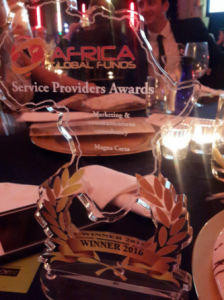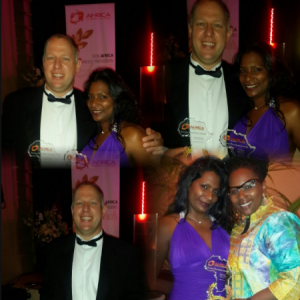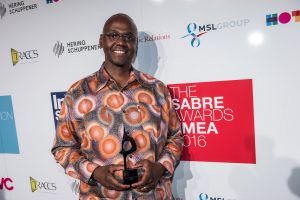The banking industry was turbulent in 2016. Among many other high profile events, Barclays sold its shares in Barclay’s Africa, announced in March 2016[1]. The banks became embroiled in the volatile political climate of the country, and banking for the working class became more topical, resulting in the South African Post Office being granted approval to establish its own bank[2], while African Bank was relaunched after being placed on Curatorship in August 2014[3]. The prevalence of these crises and the importance of this industry to the South African economy inspired Magna Carta Reputation Management Consultants to include this sector in our recent research project on corporate reputation.
The Africa Reputation Index (ARI) is an instrument designed to measure corporate reputation in 5 separate industries, including the financial sector. We began with a focus on South Africa and plan to roll the index out to additional countries in Africa in the future.
The ARI found that the top driver of corporate reputation in the banking sector is ‘being available and responsive to customer needs’, a driver of customer satisfaction (CS). In fact, collectively, all drivers of customer satisfaction are highly ranked, resulting in the CS attribute coming out as most important in this sector. In general, banks should prioritise the service acumen of their staff, especially those who deal directly with clients at the first touchpoint.
There is no doubt South Africa has a well-developed and well-regulated banking system[4]. We tend to talk about the big 5 banks, with the recent addition of Capitec to the traditional big 4 (Standard Bank, ABSA, Nedbank and FNB)[5]. Capitec is not a full service bank, but with a 26% increase in headline earnings at the end of February, 2016 to R3.2 Billion and over 7 million clients[6], Capitec is now established as a major contender in the consumer banking industry. Consumers agree that our banking industry is well-established, and according to the ARI, most are known for maintaining a good standard.
Capitec’s strategy has been to focus on customer service and this is reflected in the results of the SA Customer Satisfaction Index (SAcsi) by research firm, Consulta, where consumers consistently rate Capitec has having the highest customer satisfaction scores[7]. When looking at corporate reputation, Magna Carta’s ranking of the banks varies somewhat from Consulta’s customer satisfaction scale, but customer satisfaction is just one element of corporate reputation.
Meanwhile, the decision by some of the top banks to close the accounts of certain politically connected people in 2016 landed them in the middle of the South African political narrative. Consumers may hold diverse opinions on the banks’ position, but either way the action links to overall integrity perceptions of this industry. Integrity was found to be the second ranked reputation attribute in the financial services industry, according to the ARI.
As a close third to integrity, offering a good working environment is an important driver of corporate reputation. In general, none of the banks stand out on their employment offerings.
The banking industry has dealt with a series of retrenchments over the years which may influence perceptions around job stability at these companies. Surveys conducted by organisations such as the Top Employers Institute do not see South African banks in the top 10 employers, unless divided by industry where the major players stand out over lesser known banks[8],[9],[10],[11]. Standard Bank received recognition for having best employee policies in the SAGEA Employer Awards, 2016[12].
Consistent with other industries explored, Corporate Social Investment (CSI) drivers were rated as least important in driving corporate reputation in the financial services industry (motor vehicles was 8/9). This is not to say that these drivers aren’t important, but others are more likely to improve reputation perceptions. CSI is often recognised more by employees and is part of the internal corporate culture than external corporate reputation. Despite the extensive CSI undertakings that banks engage in, they are generally not well defined on giving back to the community or other CSI initiatives. CSI is often deeply connected to an individual’s value systems and so, while these initiatives may do wonderful work, they are perhaps less impactful when viewed from the broader societal viewpoint. Insights from our qualitative research showed that CSI is more important to middle income consumers than lower or higher income individuals.
By taking research and insights provided by the ARI on board financial services companies can radically improve their reputations. It all starts by closing the gap between what they perceive they are doing right and what consumers actually believe.
About Magna Carta’s Africa Reputation Index
Magna Carta Reputation Management Consultants, in collaboration with Yellowwood, a leading marketing strategy consultancy, developed a Reputation Index with the aim of measuring corporate reputation in the African context. Data was collated using a robust research study from a sample of 1 304 South Africans. Respondents were asked to select an industry, identify different companies in the industry, and then rate the companies on a series of 44 reputational drivers that had been identified from the focus groups and in-depth Interviews.
About Magna Carta
Magna Carta is a seasoned African consultancy that thinks globally and delivers full reputation management solutions to organisations and individuals that take their reputations seriously. We have affiliates in 18 countries in Sub-Saharan Africa, and are part of the Omnicom group which has 265 offices in 100 countries. We have also been named African Consultancy of the Year 2016 by The Holmes Report.
Founded in 1994, the year of South Africa’s democracy, Magna Carta understands the value of freedom and liberty for all people as well as the responsibility that comes with that freedom, and has since grown into one of Africa’s largest and most respected reputational management consultancies.
[1] http://www.enca.com/money/barclays-confirms-it-exiting-africa
[2] http://ewn.co.za/2016/07/09/Post-Office-to-launch-its-own-bank
[3] https://mybroadband.co.za/news/banking/160466-african-bank-relaunches-in-south-africa.html
[4] http://www.banking.org.za/docs/default-source/publication/banking-sector-overview.pdf?sfvrsn=6
[5] https://businesstech.co.za/news/banking/118310/south-africa-has-a-new-big-five/
[6] https://businesstech.co.za/news/banking/118310/south-africa-has-a-new-big-five/
[7] http://www.destinyconnect.com/2017/03/06/consumers-give-capitec-thumbs-5th-consecutive-year/
[8] https://www.investec.co.za/content/dam/investec/investec.co.za/documents/ca-programme/SAGEA%20Surveys%20Awards%20Press%20Release%202016.pdf
[9] http://www.timeslive.co.za/lifestyle/article1627159.ece
[10] http://www.fin24.com/Economy/SAs-best-employer-named-20131003
[11] http://www.fin24.com/Economy/the-best-company-to-work-for-in-africa-is-20160124
[12] https://m.careers24.com/career-advice/career-growth/5-south-african-employers-with-the-best-policies-20160805





